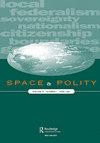加快速度,留出时间:推出《空间与政治》专题特刊概念
IF 1.1
Q2 GEOGRAPHY
引用次数: 0
摘要
特刊是一种重要的出版形式,特别是在社会科学领域,研究不仅要展示实证结果,而且要讨论研究的方法、方法论、理论、哲学、伦理学、认识论和本体论。《空间与政治》自1997年创刊以来,一直在定期刊的基础上出版特刊,共出版专题特刊20余期。这样的特刊可以提供一个富有成效的平台,让人们就一个特定的地方进行一系列的观点对话——就像我们最近关于莫斯塔尔的特刊一样,在这里,一系列关于城市的工作被汇集在一起,提出了关于如何研究“种族分裂的城市”的关键问题(Carabelli等人,2019)。它们也可以成为一个新的理论方法或长期的概念辩论在广泛的经验背景下得到发展空间的地方——就像过去关于新自由主义和危机的特刊一样(Featherstone et al., 2015)。他们也可以在提出紧迫的理论和政治问题的重要现象之间绘制关系和比较过程,例如最近关于亚洲青年政治的特刊(Lam-Knott & Cheng, 2020)或和平与公民的教育学(Staeheli, 2017)。通过特刊,期刊还可以鼓励新的学术领域的发展,如儿童和青年的政治地理学(Kallio & Häkli, 2013;Lam-Knott & Cheng, 2020;Philo & Smith, 2003)。许多特刊以会议或专题研讨会为基础,这种结合为早期职业学者提供了学习学术工作的一些关键要素的机会,他们作为活动组织者和客座编辑,或作为演讲者和作者。此外,虽然提交论文供同行评议始终是一种学习经历,但专家和特刊客座编辑的关键作用可以在流程运作良好的情况下,为作者提供特别集中和建设性的编辑反馈。我们也有理由认为,特刊论文更有可能被阅读和引用,它们可以为其他人奠定富有成效的研究议程。因此,通过特刊,期刊为国际研究培训和指导做出了贡献,同时在重要方面推进了学术研究。由于这些重要的贡献,我们很高兴为特刊推出一个新的选项,我们希望它能发扬这种格式的许多潜在好处,同时也能应对它可能带来的一些挑战。在这样做的过程中,我们试图向其他期刊学习。近年来,虚拟特刊概念在各个领域得到了创新的应用。虽然不同的出版商和期刊有不同的做法,但这些虚拟特刊通常是整理已经发表的论文,解决一个紧迫的问题,并通过社交媒体推广,通常是有时间限制的免费访问,使它们随时可用。在我们自己的领域,政治地理已经推出了一种虚拟论坛形式,允许在线收集较短观点文章的对话集合,包括邀请的贡献和公开的回应,每篇文章也在定期发行中单独发表(Nagel, 2021)。在这两种情况下,这些格式都允许一个集合本文章由计算机程序翻译,如有差异,请以英文原文为准。
Speeding up to allow time: launching the topical special issue concept in Space and Polity
Special issues are an important publication format, especially in social sciences where research is as much about presenting empirical results as it is about discussing the approaches, methodologies, theories, philosophies, ethics, epistemologies, and ontologies of the research. Offering an interdisciplinary platform for such collections, Space and Polity has always published special issues along with regular issues, totalling over 20 thematic guest edited issues since the establishment of the journal in 1997. Such special issues can provide a productive platform for bringing into dialogue a range of perspectives on a specific place—as in our recent special issue on Mostar, where a diverse set of work on the city is brought together to raise critical questions about how ‘ethnically divided cities’ are studied (Carabelli et al., 2019). They can also be a site where a new theoretical approach or longstanding conceptual debates are given space to develop across a broad range of empirical contexts—as in a past special issue on neo-liberalism and crisis (Featherstone et al., 2015). They can, as well, chart a relational and comparative course across important phenomena that raise pressing theoretical and political questions, as in recent special issues on youth politics in Asia (Lam-Knott & Cheng, 2020) or the pedagogies of peace and citizenship (Staeheli, 2017). Through special issues a journal can also encourage the development of new scholarly fields, such as political geographies of childhood and youth (Kallio & Häkli, 2013; Lam-Knott & Cheng, 2020; Philo & Smith, 2003). Many special issues are based on a conference session or a thematic seminar—a combination that offers opportunities for early career scholars to learn some of the key elements of academic work, in their roles as event organizers and guest editors, or as presenters and authors. Further, while submitting a paper for peer review is always a learning experience, the crucial role of expert and engaged guest editors in special issues can, when processes work well, allow for especially focused and constructive editorial feedback for authors. There are also reasons to think that special issue papers are more likely to be read and cited, and they can set out productive research agendas for others to build on. Thus, through special issues, journals contribute to international research training and mentoring, while taking forward scholarship in important ways. Because of these important contributions, we are excited to launch a new option for special issues that, we hope, can carry forward many of the potential benefits of the format, while also responding to some of the challenges it can pose. In doing so, we have sought to learn from what other journals are doing. Recent years have seen innovative use of virtual special issue concepts across fields. While there are variations across publishers and journals, these virtual special issues often curate already published papers addressing an urgent issue and make them readily available through social media promotion and, often, a time-limited period of free access. In our own field, Political Geography has launched a virtual forum format that allows for a dialogical collection of shorter viewpoint articles that are gathered online, including both invited contributions and open responses, with each article also published individually in a regular issue (Nagel, 2021). In both cases, these formats allow for a collection
求助全文
通过发布文献求助,成功后即可免费获取论文全文。
去求助
来源期刊

SPACE AND POLITY
GEOGRAPHY-
CiteScore
4.10
自引率
4.20%
发文量
19
期刊介绍:
Space & Polity is a fully refereed scholarly international journal devoted to the theoretical and empirical understanding of the changing relationships between the state, and regional and local forms of governance. The journal provides a forum aimed particularly at bringing together social scientists currently working in a variety of disciplines, including geography, political science, sociology, economics, anthropology and development studies and who have a common interest in the relationships between space, place and politics in less developed as well as the advanced economies.
 求助内容:
求助内容: 应助结果提醒方式:
应助结果提醒方式:


